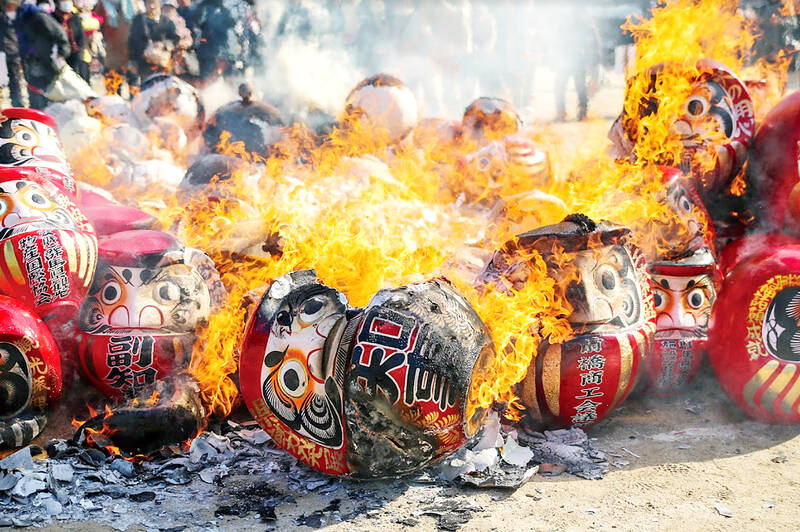Japanese culture has lots of traditional charms and symbols of good fortune. One of these is the Daruma doll. They can be seen in shop windows and homes, as well as in movies and animated programs. People use them for encouragement and to help themselves reach their goals. The typical Daruma doll is just a round ball made of paper mache, usually painted red, with part of the face left blank, symbolizing the fact that one’s future is not yet determined. The dolls have no arms or legs, and when they are sold at temples, they don’t have any eyes. In fact, it’s up to the person who buys one to give them their eyes.
The dolls are modeled after a legendary Buddhist monk named Bodhidharma, who lived during the 5th and 6th centuries. He is famous for bringing Zen Buddhism to China and Japan, where he is known as Daruma. According to one legend, Bodhidharma meditated for nine years in a cave facing a wall with his eyes open. He accidentally fell asleep just once and was so furious with himself that he cut off his own eyelids so that he would never close his eyes again. Besides losing his eyelids, Bodhidharma’s arms and legs also atrophied and fell off as a consequence of his immobility for nine years, leaving him with just a head and a torso.
Despite the strange story to explain their appearance, the dolls represent Daruma’s perseverance and commitment to reaching his goals. In Japanese culture, people buy the dolls with a particular goal in mind. Then, they display the dolls where they will see them regularly. This reminds them to work toward the thing they hope to achieve. People may also hold the doll with their eyes closed and say a prayer for motivation or courage in reaching their goals.

Photos: Shutterstock I 照片: Shutterstock
日本文化中有許多傳統的幸運符和好運象徵物。其中一個就是達摩不倒翁。可以在商店櫥窗中、家中,以及電影和動畫節目中見到它們。人們使用它們來當作鼓勵,並幫助自己達成目標。典型的達摩不倒翁僅是一個由混凝紙漿製成的圓球,通常被漆成紅色,有著一張部分是空白的面孔,象徵某人的未來尚未被決定的事實。這些達摩不倒翁沒有手臂或腿,且它們在寺廟被出售時沒有眼睛。事實上,是否幫達摩不倒翁繪製眼睛取決於購買者。
這些達摩不倒翁是以生活在五至六世紀、一位名為菩提達摩的傳奇佛教僧人為範本而設計。他以將佛教禪宗傳入中國和日本而聞名,他在日本被稱為 Daruma(達摩)。根據一個傳說,菩提達摩在一個洞穴中睜開著眼睛面壁打坐了九年。他只有一次不小心睡著了,他對自己非常生氣,所以割掉了自己的眼皮,這樣他的眼睛就不會再閉上了。菩提達摩除了失去了眼皮,他的手臂和腿也因為九年不動而萎縮掉了下來,只剩下一個頭和軀幹。
儘管有著奇怪的故事來解釋它們的外表,這些達摩不倒翁代表著達摩的堅持不懈和致力於達成其目標。在日本文化中,人們購買這些達摩不倒翁時心中有著特定的目標。然後,他們將這些達摩不倒翁陳列在他們能夠經常看到的地方。這提醒他們要為了他們希望實現的事情而努力。人們也可能會閉著眼睛握著這些達摩不倒翁,為自己在達成目標的過程中能夠獲得動力或勇氣而祈禱。

Photos: Shutterstock I 照片: Shutterstock
Word in Use
1. encouragement n. 鼓勵
Andy owes his success to his girlfriend’s encouragement.

Photos: Shutterstock I 照片: Shutterstock
安迪把他的成功歸功於女友的鼓勵。
2. blank a. 空白的
I went blank when the teacher asked me a question.
老師問我問題時,我腦中一片空白。
3. symbolize vt. 象徵
This flower symbolizes youth and vitality.
這朵花象徵青春和活力。
4. legendary a. 傳奇的;傳說的
A Japanese TV station produced a special drama to commemorate this legendary singer.
一家日本電視臺製作了一齣特別的劇來紀念這位傳奇歌手。
5. meditate vi. 打坐,冥想
Stephen spends 15 minutes meditating every evening.
史蒂芬每晚都會花十五分鐘冥想。
Practical Phrases
1. be up to sb. 取決於某人,在於某人
It is up to each student whether or not he or she passes the exam.
能否通過考試全掌握在每個學生自己手中。
2. be modeled after... 以…為範本(設計、製作等)
model vt. 使仿製,使仿效
This church was modeled after one in Italy.
這座教堂是以義大利的一座教堂為範本而設計的。
3. be furious with sb. 生某人的氣
Tina’s teacher was furious with her because she kept interrupting him.
蒂娜的老師對她很火大,因為她不斷地打斷他。
4. as a consequence of... = as a result of... 因為 ∕ 由於…
consequence n. 後果,結果
Ken was late again as a consequence of a traffic jam.
阿肯因為塞車又遲到了。
5. remind sb to V 提醒某人(做)……
remind vt. 提醒;使想起
Please remind me to call Sarah back this afternoon.
請提醒我下午回電給莎拉。
聽文章朗讀及講解: https://ivy.pse.is/455bfu
本文出自常春藤解析英語雜誌: www.ivy.com.tw

In an effort to fight phone scams, British mobile phone company O2 has introduced Daisy, an AI designed to engage phone con artists in time-wasting conversations. Daisy is portrayed as a kindly British granny, exploiting scammers’ tendency to target the elderly. Her voice, based on a real grandmother’s for authenticity, adds to her credibility in the role. “O2” has distributed several dedicated phone numbers online to direct scammers to Daisy instead of actual customers. When Daisy receives a call, she translates the scammers’ spoken words into text and then responds to them accordingly through a text-to-speech system. Remarkably, Daisy

Bilingual Story is a fictionalized account. 雙語故事部分內容純屬虛構。 Emma had reviewed 41 resumes that morning. While the ATS screened out 288 unqualified, she screened for AI slop. She could spot it a mile away. She muttered AI buzzwords like curses under her breath. “Team player.” “Results-driven.” “Stakeholder alignment.” “Leveraging core competencies.” Each resume reeked of AI modeling: a cemetery of cliches, tombstones of personality. AI wasn’t just changing hiring. It was draining the humanity from it. Then she found it: a plain PDF cover letter. No template. No design flourishes. The first line read: “I once tried to automate my

Every May 1, Hawaii comes alive with Lei Day, a festival celebrating the rich culture and spirit of the islands. Initiated in 1927 by the poet Don Blanding, Lei Day began as a tribute to the Hawaiian custom of making and wearing leis. The idea was quickly adopted and officially recognized as a holiday in 1929, and leis have since become a symbol of local pride and cultural preservation. In Hawaiian culture, leis are more than decorative garlands made from flowers, shells or feathers. For Hawaiians, giving a lei is as natural as saying “aloha.” It shows love and

1. 他走出門,左右看一下,就過了馬路。 ˇ He walked outside, looked left and right, and crossed the road. χ He walked outside and looked left and right, crossed the road. 註︰並列連接詞 and 在這句中連接三個述語。一般的結構是 x, y, and z。x and y and z 是加強語氣的結構,x and y, z 則不可以。 2. 他們知道自己的弱點以及如何趕上其他競爭者。 ˇ They saw where their weak points lay and how they could catch up with the other competitors. χ They saw where their weak points lay and how to catch up with the other competitors. 註:and 一般連接同等成分,結構相等的單詞、片語或子句。誤句中 and 的前面是子句,後面是不定詞片語,不能用 and 連接,必須把不定詞片語改為子句,and 前後的結構才相等。 3. 她坐上計程車,直接到機場。 ˇ She took a cab, which took her straight to the airport. ˇ She took a cab and it took her straight